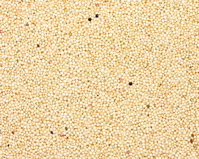Amaranth

Amaranth is a high-protein, mineral-rich, gluten-free grain. When cooked, it has a gelatinous texture and makes a delicious hot breakfast cereal.
To cook, mix 1 cup amaranth with 2-1/2 cup water. Bring to a boil. Reduce heat to simmer, cover, and cook for 20 minutes. Mix in berries, banana, apple, or other fruit a few minutes before cooking is complete. Amaranth can also be sprouted.
Nutritional data for cooked amaranth is unavailable. 1/3 cup of uncooked amaranth makes approximately 1 cup of cooked amaranth.
| Serving size: | 1/3 cup, uncooked |
| Region: | Central and South America |
Health Benefits
| Bones | Helps prevent and treat osteoporosis due to high levels of calcium, magnesium, and iron. |
| Memory | Whole grains are a great source of folate, B vitamins, and zinc, all of which improve brain function, including memory. |
Nutrients
| Calcium | 100 mg | 8% | |
| Copper | 0.5 mg | 25% | |
| Fiber | 6 g | 24% | |
| Iron | 3.9 mg | 26% | Found in whole grains only. Milling and refining grains removes almost all of the iron. |
| Magnesium | 173 mg | 43% | |
| Manganese | 1.5 mg | 50% | |
| Omega-6 Fatty Acids | 1842 mg | N/A | |
| Phosphorous | 296 mg | 25% | |
| Protein/Amino Acids | 9.4 g | 19% | An excellent source of all essential amino acids. |
| Vitamin B9/Folate | 31.8 mcg | 16% | |
| Zinc | 2.1 mg | 14% |
